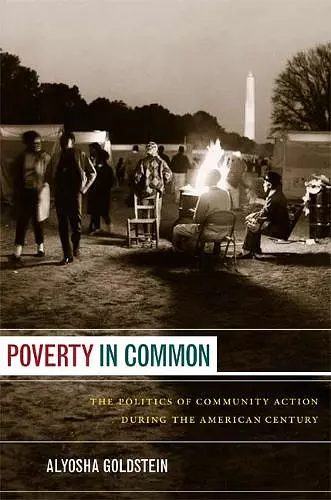Poverty in Common
The Politics of Community Action during the American Century
Format:Paperback
Publisher:Duke University Press
Published:23rd Mar '12
Currently unavailable, and unfortunately no date known when it will be back

This work looks at inter-related post WWII case studies to analyze the ways in which different groups, mostly governmental agencies and emerging activist organizations, invoked the idea of "community" in anti-poverty initiatives during the late 1950s and 1960s.
After the Second World War, the idea that local community action was indispensable for the alleviation of poverty was broadly embraced by US policymakers, social scientists, international development specialists, and grassroots activists. Governmental efforts to mobilize community action in the name of democracy served as a volatile condition of possibility for poor people and dispossessed groups negotiating the tension between calls for self-help and demands for self-determination in the era of the Cold War and global decolonization. In Poverty in Common, Alyosha Goldstein suggests new ways to think about the relationship among liberalism, government, and inequality in the United States. He does so by analyzing historical dynamics including Progressive-era reform as a precursor to community development during the Cold War, the ways that the language of "underdevelopment" articulated ideas about poverty and foreignness, the use of poverty as a crucible of interest group politics, and radical groups' critical reframing of community action in anticolonial terms. During the mid-twentieth century, approaches to poverty in the United States were linked to the racialized and gendered negotiation of boundaries—between the foreign and the domestic, empire and nation, violence and order, and dependency and autonomy.
"Poverty in Common challenges us to think anew about the meaning of community action in twentieth-century liberal reform politics. Alyosha Goldstein builds on wide-ranging historical research to uncover the deep-seated tensions that defined community-based antipoverty programs from the start, and to document what happened when officially sanctioned strategies of civic order and social incorporation came up against locally mobilized strategies of political disruption aimed at challenging the social and economic status quo. This is a history more of struggle and stalemate than of triumph and defeat. In Goldstein's able hands, it is vital and illuminating."—Alice O'Connor, author of Poverty Knowledge
"Poverty in Common is a highly original and nuanced study of how 'the government of poverty' at home and abroad became central to postwar US liberalism and its distinctive precipitates of violence and reform, force and freedom, democracy and empire."—Nikhil Pal Singh, author of Black Is a Country
"Poverty in Common is an insightful analysis of how community development figured in liberal reformist and nation-building programs in the United States during the 1950s and 1960s. As Alyosha Goldstein argues so convincingly, liberals depended on assertions of community participation and even required that oppressed populations be made to participate in a reformist agenda. Yet liberals circumscribed that participation by pushing aside pressing questions about structural inequality, entrenched racism, and the redistribution of resources. Poverty in Common offers a compelling way to think about the powerful appeal and ultimate demise of postwar American liberalism.”—Michael E. Latham, author of The Right Kind of Revolution
“The book provides a fresh take on the concept and history of Community Action. A particular strong point of the book is its analysis of the international dimension of community development and how ideas of community participation guided US foreign policy in the postwar period. . . . Poverty in Common, should be on any War on Poverty or Community Action specialist’s reading list.” -- David Torstensson * Journal of Children and Poverty *
"[A]nyone interested in American studies, especially scholars of radical politics, social movements, and social welfare, will be impressed by this timely and erudite volume." -- Mark Edward Braun * American Historical Review *
“Goldstein’s book is an exemplary history of mid‐twentieth-century liberalism. The emphasis on Cold War convergence between domestic and international discourse around ‘underdevelopment’ highlights the strengthening of U.S. empire during this period. Moreover, the argument that ‘the poor’ are constructed by liberals as a monolithic, foreign body in a liberal democracy is persuasive and worth considering further in current discussions of global capitalism." -- Rose Ernst * Political Science Quarterly *
“Poverty in Common is an eloquent contribution to a vast literature that seeks to explain the persistence and spread of poverty at the heart of the most affluent nation on earth...A real virtue of the book, particularly for those who are not students of the US, is Goldstein’s careful integration of US foreign policy imperatives with its domestic policy bent.” -- Elizabeth Vibert * Labour/Le Travail *
“Amid a sea of historical scholarship on the evolution of modern conservatism in the United States, Alyosha Goldstein offers a provocative new interpretation of midtwentieth-century liberalism…. [T]his book should become required reading not only for scholars of the War on Poverty and 1960s liberalism but anybody engaged in questions of twentieth-century US political, policy or social movement history.” -- Marisa Chappell * Social History *
ISBN: 9780822351818
Dimensions: unknown
Weight: 689g
392 pages